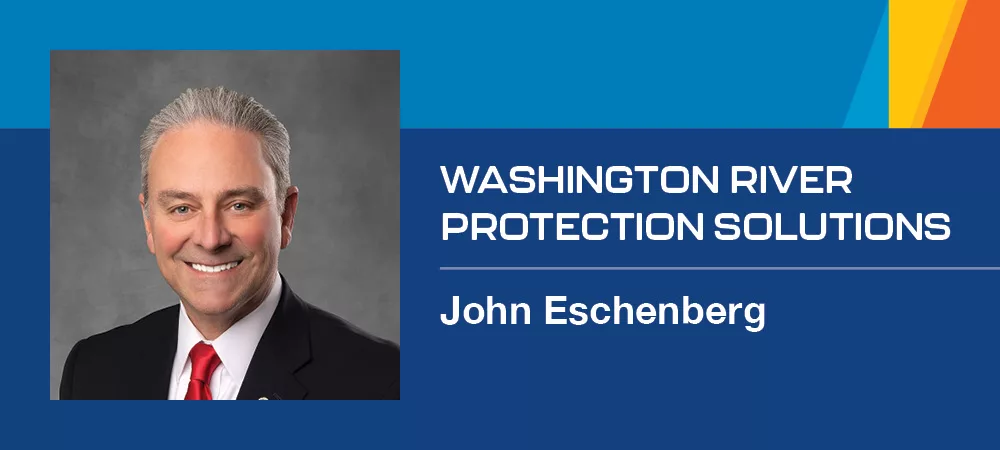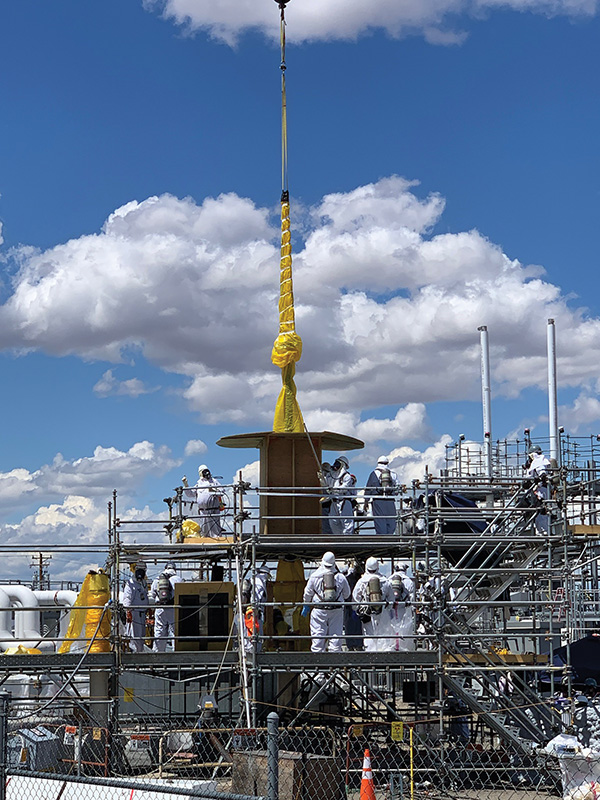
Home » Pandemic didn’t stop us from making progress on our goals
Pandemic didn’t stop us from making progress on our goals

April 16, 2021
Each year, I appreciate the Tri-Cities Area Journal of Business’ Hanford edition, which is the perfect opportunity to update our community on Washington River Protection Solutions’ accomplishments as the U.S. Department of Energy’s tank operations contractor at the Hanford site.

As we all know, this past year has been like no other. Covid-19 has caused hardship and disruption, forcing most of us to make changes in our everyday lives to ensure the safety of our families, friends and neighbors.
I’m proud to report that the WRPS team, 3,200 people strong, confronted the pandemic head-on and overcame the challenges of teleworking, social distancing, new face-covering guidelines and personal hygiene protocols to safely make progress on our critical work managing 56 million gallons of highly radioactive and chemical waste stored in Hanford’s 177 underground tanks.
Despite the difficulty of the pandemic, we compiled a long list of accomplishments in 2020.
Most notable is the progress we made on the One Hanford mission to treat tank waste using the Direct-Feed Low-Activity Waste (DFLAW) approach.
We took a giant step forward in the “path to glass” by installing the Tank-Side Cesium Removal system next to AP Tank Farm.
The system will separate cesium and undissolved solid materials from tank waste, so we can feed the pretreated waste directly to the Low- Activity Waste Facility at the Waste Treatment and Immobilization Plant (WTP), where it will be vitrified, or immobilized in glass, for safe disposal.
We are on schedule to test the system this spring and have it operational by the year’s end.
In addition, we confirmed through pressure testing that our first physical connection to WTP, transfer lines that will move condensate produced during vitrification to our Effluent Treatment Facility, is ready to serve when needed.
Our treatment facility staff processed about 3.2 million gallons of wastewater from our current tank waste storage and retrieval mission while completing a series of upgrades to support future DFLAW operations.
One of the cornerstones of our risk-reduction mission is to retrieve and transfer waste from older single-shell tanks to more robust double-shell tanks for safe storage until it can be treated. We are in the process of finalizing recent work to retrieve waste from two more single-shell tanks, which would bring the project up to 18 tanks completed. We are preparing to begin retrieving waste from another tank this summer.
Ensuring the safe storage of waste in the tanks also is essential to our risk-reduction mission and the safety of the workforce and community. That is why we put great energy into our tank integrity program. We have teams of highly-skilled engineers who develop and deploy unique robotic systems to inspect our tanks visually and ultrasonically on a regular basis.
While we perform high-risk work daily, we never forget that we are only successful if we work safely.
In 2020, we received several industry awards commending our safety performance, including the DOE Voluntary Protection Program’s Star of Excellence for the sixth consecutive year. We also were named one of America’s Safest Companies by EHS Today, a leading publication in the safety industry, for excellence in safety leadership and promoting a world-class safety culture.
Finally, I was honored to be recognized by the National Safety Council as a “CEO Who Gets It” for going above and beyond to protect employees both on and off the job. While my name is on the award, I’m proud to say this one was earned by all of my tank farms teammates.
Speaking of teammates, WRPS is grateful to be a member of the Tri-Cities community and understands our success is made possible by our partnerships with local businesses.
Since the beginning of our contract in 2008, we have issued more than
$1.2 billion in subcontracts to businesses in Benton, Franklin and Yakima counties. We also have donated $7.7 million to programs and initiatives that we believe improve the quality of life for all of us who call the Mid-Columbia home.
Now in our 13th year of managing the Hanford tank farms for the Department of Energy, we are committed to building on our record of achievement. We will do so by continuing to work safely, focusing on mission delivery and being good stewards of taxpayer dollars.
John Eschenberg is president and chief executive officer of Washington River Protectio
Hanford
KEYWORDS april 2021





